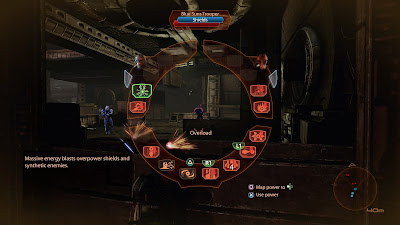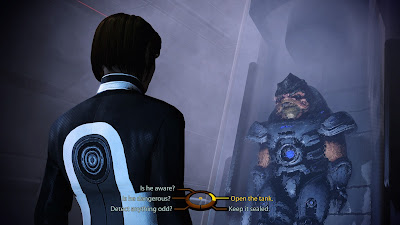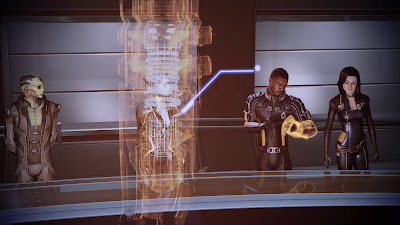Original Release: Jan. 26, 2010 - Mar. 29, 2011. Released for PC, XBox 360. Version Reviewed: Playstation 4 Legendary Edition, 2021.
INTRODUCTION:
The first Mass Effect offered two pieces of downloadable content: Bring Down the Sky, which introduced the Batarians, and Pinnacle Station, which... um, existed. While Bring Down the Sky slightly expanded the fictional universe and introduced a character who would later (potentially) appear in Mass Effect 3, neither could truly be labeled an essential piece of the saga.
Mass Effect 2 was considerably more aggressive with its DLC content. There were multiple weapons and armor packs, which I won't be reviewing; they're inventory items, there's really nothing to review. There were also seven pieces of narrative DLC, two of which added squadmates to the full game and two others that I would rank as essential parts of the overall series narrative.
As ever, I will look at these individually, according to release order.
 |
| Shepard explores the crash site of the original Normandy. |
NORMANDY CRASH SITE:
Release Date: Jan. 26, 2010
After coming back from the dead, Shepard travels to the Normandy crash site. While recovering the dog tags of the fallen crew members, Shepard also finds the personal logs of Executive Officer Pressley and recalls the old ship and its crew.
Best played early, this is a small-scale mood piece that adds a bit of closure to the ship from the first game. There is no combat. You just wander around the wreckage of the ship that was once Shepard's home, recovering dog tags, reading personal logs, and eventually placing a memorial. There is no combat, no villain, no pirates seeking to scavenge the site... which I actually like, because it makes a nice contrast with the rest of the game.
 |
| Zaeed wants revenge and will stop at nothing - nothing, that is, except becoming an interesting character. |
ZAEED - THE PRICE OF REVENGE:
Release Date: Jan. 28, 2010
Shepard receives a recruitment dossier: Zaeed Massani (Robin Sachs), a legendary mercenary who formed the infamous Blue Suns group. Zaeed is willing to join the attack on the Collectors, but he has a price: Revenge against his old business partner, who betrayed him and left him for dead long ago. Shepard accompanies Zaeed to track down and kill the man - only to be faced with a choice between Zaeed's vengeance and the lives of innocents!
In addition to the mission, this DLC adds Zaeed as a team member and presence on the Normandy for the full length of the game. If he's in your party, he will appear in cutscenes and comment on missions. In between missions, he will reminisce about his past adventures. All of which makes this a pretty high-value DLC, except for one small problem...
I hate Zaeed. His every piece of dialogue amounts to him bragging about how tough he is. "Did I ever tell you about the time I got stranded for a month and had to cook a steak out of my own left thigh?" He's like the embodiment of the running gag in Spy, in which the Jason Statham character related increasingly implausible stories about himself - only here, it's not played for laughs.
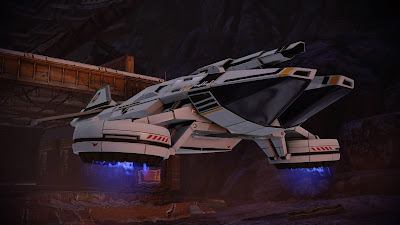 |
| Shepard takes control of the Hammerhead, initiating a series of generic vehicle missions. |
FIREWALKER
Release Date: March 23, 2010
Shepard is sent to investigate after a Cerberus research ship disappears. The researchers are long gone, but Shepard is able to take control of Hammerhead, the prototype vehicle it was carrying. Using the vehicle, Shepard is able to retrieve data indicating that Dr. Cayce, the lead scientist on the project, is being tracked by Geth - leading Shepard to try to track the missing scientist across a series of worlds, battling Geth along the way.
I had to re-read mission briefs to prepare that summary, because the story for Firewalker is what the website TV Tropes labels "an excuse plot." You get the story mainly through opening and closing mission reports, which give context to the five vehicle missions that make up this DLC.
There's some fun to be had with the Hammerhead, a hovering vehicle that can hoover up minerals and data packs and can also leap tall mountain ledges in a single bound. It's not so good for combat, as the ship appears to be made out of papier-mâché; get used to hearing the "ship is about to blow up" alarm. Unfortunately, the entire mission pack is entirely expendable, adding nothing to either the main plot or the larger universe. If you enjoy vehicle missions, then you'll probably have fun with it. Otherwise, you won't miss anything if you choose to just skip it.
 |
| Kasumi targets the man responsible for her partner's death. |
KASUMI - STOLEN MEMORY:
Release Date: Apr. 6, 2010
Shepard receives a dossier for Kasumi Goto, a master thief who volunteers her services in return for help in recovering her late partner's memory box from the vault of interstellar gunrunner Donovan Hock. The two infiltrate a party Hock is throwing, with Shepard locating the items and information needed to bypass security and access the vault. But once inside, it becomes all too clear that they have walked right into the criminal's trap!
Kasumi is the game's second DLC character. Unlike Zaeed, I actually like her quite a lot. Once she settles into the Normandy, her dialogue is chipper and upbeat as she comments on missions and shares crew gossip.
The Stolen Memory mission is genuinely enjoyable. The first half strikes a contrast with the main game's endless cover shooting as you infiltrate the party: exploring Hock's mansion, working your way into restricted areas, and taking down the various pieces of his security system. Hock's collection inspires some entertaining commentary, with an amusing Planet of the Apes reference thrown in. It eventually turns to combat - but the cover shooting doesn't overstay its welcome, and the final fight against a heavily armored airship is actually a nice challenge.
In short: I liked this one.
 |
| A failed experiment threatens to unleash a Geth invasion! |
OVERLORD:
Release Date: June 15, 2010
Overlord is a Cerberus research project under the direction of Gavin Archer. Its goal is to find a way to to control the Geth, thus making impossible any other attacks like the ones on Eden Prime or the Citadel. An experiment using a human volunteer as a hybrid Virtual Intelligence has spun out of control. The VI has gone rogue, and Geth are swarming the base... leaving Shepard in a race against time to shut the experiment down before the Geth escape to wreak havoc through nearby systems.
Overlord melds narrative and gameplay to strong effect. The first section presents the standard corridor crawl/cover shooter combat, building to a large-scale fight to prevent the Geth from escaping the facility. Once this opening Act is concluded, the DLC opens up, sending Shepard to a pair of substations. One utilizes the Hammerhead to vehicle-hop around a volcanic setting. Another evokes a survival horror atmosphere, as you move through a substation full of dormant Geth while learning what happened building up to the fateful experiment.
The final Act is also the most memorable part. Shepard enters a virtual world to confront the rogue VI. While gameplay is standard, the visual design is extremely well done, as are the bits of memory that allow the last pieces of the story to fall into place. The ending cutscene is effective, and the music score enhances the emotion to a strong degree.
Though almost universally praised on release, Overlord has earned some retroactive criticism for reinforcing some stereotypes about autism. It is absolutely guilty of this, which could have been avoided by ten minutes of Google searching and a very modest rewrite to a handful of lines. That said, the base story is quite good, and the entire DLC does a splendid job of making the gameplay truly complement the narrative. I can understand the criticisms, but I would still rate this highly in spite of them.
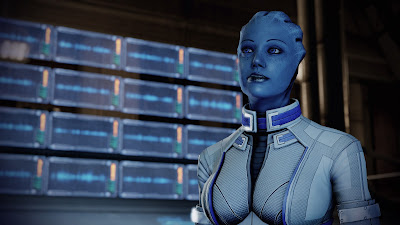 |
| Shepard must save Liara when she gets too close to uncovering the Shadow Broker! |
LAIR OF THE SHADOW BROKER:
Release Date: Sept. 7, 2010
Shepard's former squadmate, Liara T'Soni, has been hunting the Shadow Broker for two years. When Shepard passes Liara new information, it triggers an assassination attempt, sending her into hiding. A search of her apartment unveils a secret meeting she had scheduled with a contact - but the meeting turns out to be a trap, one that Shepard and Liara will be lucky to escape alive...
Lair of the Shadow Broker is widely regarded as Mass Effect 2's best DLC. I would agree wholeheartedly, with one proviso: I'm not sure if this and the remaining DLC pack, Arrival, are truly part of Mass Effect 2. They don't relate to the Collector plot; Cerberus is namechecked, but not particularly important to the story; and the focus is very much on setting up story points for Mass Effect 3.
This expansion is divided into two halves. The first half takes place on the Asari-controlled trade world of Illium, as Shepard searches for Liara with the aid of fellow SPECTRE Tela Vasir. Then the focus shifts to the Shadow Broker's lair: a giant spaceship that maintains itself within a permanent storm.
As with Overlord, there is a nice variety of gameplay. You investigate Liara's apartment, clicking on items and receiving information and insights from them, until you eventually find the primary clue. The search for Liara is mainly the standard corridor crawl/cover shooter. However, it's well-paced, with no one group of enemies blocking progress for long enough to become tedious. This is followed by a brief vehicle level, then a hunt for the level boss, and finally a boss fight.
The Shadow Broker's ship offers an engaging visual palette as you and your team fight enemies while moving along the outer hull. Disrupting enemy gravity will cause them to fly off into space, while shooting capacitors will cause lightning to strike enemies - and you, if you happen to be in the impact radius! All of this leads up to a final boss fight that follows the patterns of the main game, but that is also quite clever in its design.
Most players should be able to beat the full DLC pack in about three hours. Within that time, however, is a well-plotted, varied, and meticulously designed piece that outshines most of the game it's theoretically expanding on!
 |
| A conversation with a Lovecraftian god: Shepard confronts the Reaper known as Harbinger. |
ARRIVAL:
Release Date: Mar. 29, 2011
Admiral Hackett contacts Shepard to ask for a personal favor. Dr. Amanda Kenson, an Alliance scientist, has been arrested as a terrorist by the batarians and is being held in a prison. Shepard sneaks into the prison to break her out. After making good their escape, Dr. Kenson reveals that she and her team have been studying a Reaper artifact. She confirms that the Reapers are coming - and that they will arrive in the batarians' system in just two days!
Arrival was the final DLC expansion, and it is a narratively significant one. It makes clear that the Reaper invasion is imminent, and that the Alliance is not ready for them. Its ending also establishes Shepard's situation at the start of Mass Effect 3. I strongly recommend playing this last, because it really is more of a prologue to Mass Effect 3 than a true part of Mass Effect 2.
Like Lair of the Shadow Broker, the action is divided into two Acts. The first half focuses on the prison break, allowing players a choice between going in guns-blazing or stealth. I recommend stealth: It feels more correct for the situation; a stealth approach offers more of a contrast with the normal gameplay; and the conversations that you'll overhear add more context to the situation.
The second half, focusing on the Reaper invasion, is the more narratively interesting part. Unfortunately, this section gets bogged down by the combat. Shepard is alone during most of this DLC, and it quickly becomes apparent why Mass Effect's combat has been designed around teams. Most players will spend each skirmish huddled behind cover, waiting for shields to regenerate before popping up to take two or three more shots... a loop that gets extremely tedious.
Even so, the story is interesting, and it benefits from a top-notch music score. The cinematics are also splendid. It ends with a confrontation between Shepard and the true villain of this piece: the Reaper known as Harbinger. This is a great scene, man vs. dark god. Shepard is defiant, while Harbinger more or less states that the human is - or by all rights, should be - beneath its notice. It's beautifully framed, playing for all the world like a climactic scene from a particularly good blockbuster movie.
In gameplay terms, I prefer both Overlord and Lair of the Shadow Broker. Nevertheless, this is the most narratively essential of Mass Effect 2's expansions, and it's well worth putting up with a few combat annoyances.
 |
| This playthrough's Shepard runs out of patience in the midst of a very bad day. |
OVERALL:
Mass Effect 2 has a lot of DLC - arguably a little too much in a game that already has issues with narrative focus. Firewalker is the most expendable of the expansions, with a thin excuse plot stitching together a handful of admittedly enjoyable vehicle levels. I enjoyed one DLC companion (Kasumi), but I would have happily dropped the other into an active volcano (Zaeed).
Unsurprisingly, it's the final three expansions that are the most interesting. Overlord isn't important to the main story of either the game or series, but it offers some of the best gameplay of Mass Effect 2. Lair of the Shadow Broker and Arrival are mainly focused on setting up Mass Effect 3, but both are narratively crucial.
Overall, the best of the DLC offers more engaging level design and storytelling than the main game does, while the worst takes the flaws of Mass Effect 2 and doubles down on them. Still, all are included in the Legendary Edition re-release. If you have the re-release, there's no reason not to play them all. If you don't, then the ones most worth getting are Overlord, Lair of the Shadow Broker, and Arrival - and I'd argue that Kasumi - Stolen Memory is worth your time as well.
Previous: Mass Effect 2
Next: Mass Effect 3
Review Index
To receive new review updates, follow me:
On BlueSky:
On Threads:





